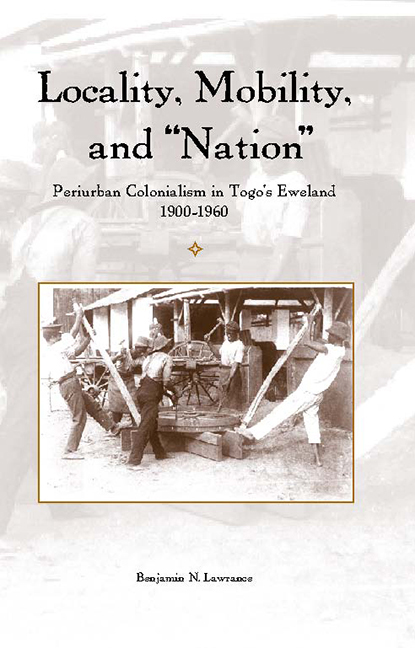Book contents
- Frontmatter
- Dedication
- Contents
- List of Illustrations
- Preface
- Notes on Orthography
- Map
- Introduction: Conceptualizing Periurban Colonialism in Sub-Saharan Africa
- 1 Mobility, Locality, and Ewe Identity in Periurban Eweland
- 2 Intervention and Dissent: Manufacturing the Model Periurban Chief
- 3 Crisis in an Ewe “Capital”: The Periurban Zone Descends on t he City
- 4 Vodou and Resistance: Politico-Religious Crises in t he Periurban Landscape
- 5 The German Togo-Bund and the Periurban Manifestations of “Nation”
- 6 From Eweland to la République Togolaise: Le Guide du Togo and the Periurban Circulation of Knowledge
- Epilogue
- Notes
- Bibliography
- Index
- Frontmatter
- Dedication
- Contents
- List of Illustrations
- Preface
- Notes on Orthography
- Map
- Introduction: Conceptualizing Periurban Colonialism in Sub-Saharan Africa
- 1 Mobility, Locality, and Ewe Identity in Periurban Eweland
- 2 Intervention and Dissent: Manufacturing the Model Periurban Chief
- 3 Crisis in an Ewe “Capital”: The Periurban Zone Descends on t he City
- 4 Vodou and Resistance: Politico-Religious Crises in t he Periurban Landscape
- 5 The German Togo-Bund and the Periurban Manifestations of “Nation”
- 6 From Eweland to la République Togolaise: Le Guide du Togo and the Periurban Circulation of Knowledge
- Epilogue
- Notes
- Bibliography
- Index
Summary
In one of those moments that every Africanist hopes for and yet fears, the death of Togo's longtime dictator Gnassingbé Eyadéma on Saturday, February 5, 2005, propelled the tiny nation into the international spotlight. While working on this book a month earlier, I had toyed with all sorts of witty, amusing, and admittedly less than profound opening statements for a preface. None of those seemed even remotely appropriate any longer. Indeed, the violent and contested election resulting from the failed coup d'état of Eyadéma's son, and the constant rumors of an imminent Rwanda-style north-south, Ewe-Kabyé conflict, underscores the deep legacy of French colonialism, despite France's relatively brief forty-year occupation.
Eyadéma, a captain in the French colonial army who allegedly served alongside Jacques Chirac, is widely blamed for the 1963 assassination of Togo's first president, Sylvanus Olympio, as he attempted to seek refuge in the U.S. embassy. After the overthrow of Olympio's regime, Eyadéma ruled from the wings until seizing formal power in a second coup in 1967. Although he was Africa's longest-ruling leader, the broker of several important international trade deals, and a promoter of ECOWAS and the African Union in regional peacekeeping and conflict-resolution activities, few international dignitaries attended the burial of Le Baobab. And despite the continuing tensions and refugee crisis in Togo, Eyadéma's death is a cause for hope for scholars of the region. Perhaps now, participants in the nationalism of the 1940s and fifties, and those who survived the military crackdowns and violent political purges by fleeing abroad or hiding in Togo, will come forward and tell their versions of the path to independence.
Until such a time, however, historians will continue to construct an account of Togolese nationalism glorifying Olympio, bewailing Eyadéma, and ignoring the role of the wider citizenry. Understanding the significance of 1940s and fifties for Togo's national trajectory is therefore made doubly difficult: on the one hand, the miserable fate of the fledgling Togo nation has provoked an almost incontestable torrent of hagiography; on the other hand, few are willing to come forward to tell their personal stories, whether or not they sit well with the conventional wisdom. In the absence of reliable oral testimonies from participants in Olympio's movement, then, I have tried to approach the history of Togolese nationalism from a sideways angle.
- Type
- Chapter
- Information
- Locality, Mobility, and "Nation"Periurban Colonialism in Togo's Eweland, 1900–1960, pp. xi - xivPublisher: Boydell & BrewerPrint publication year: 2007

